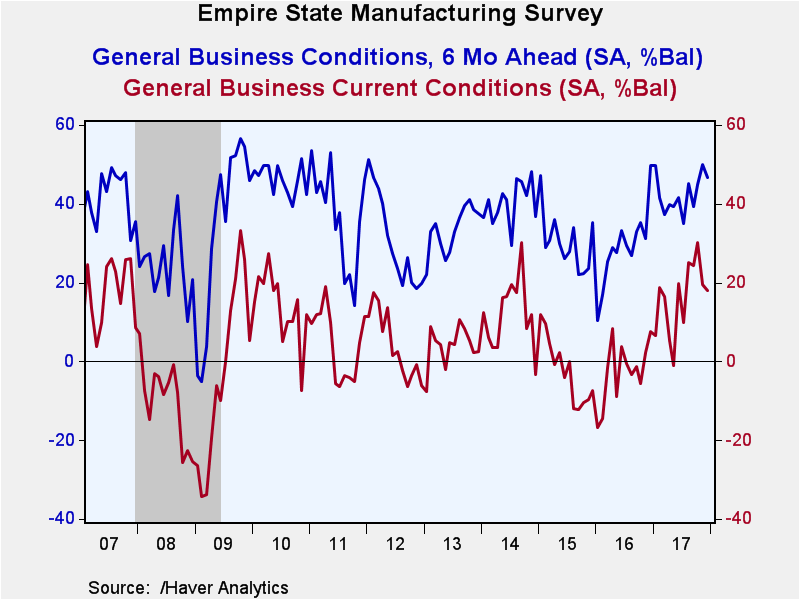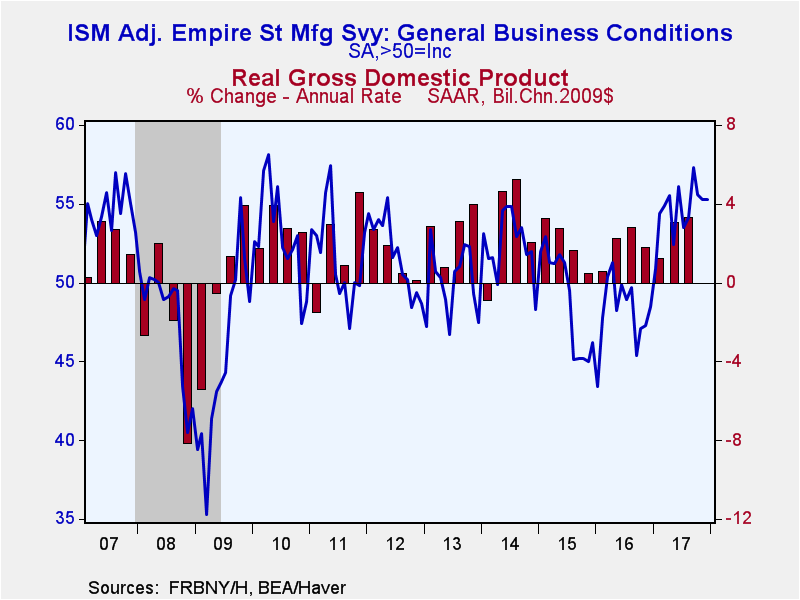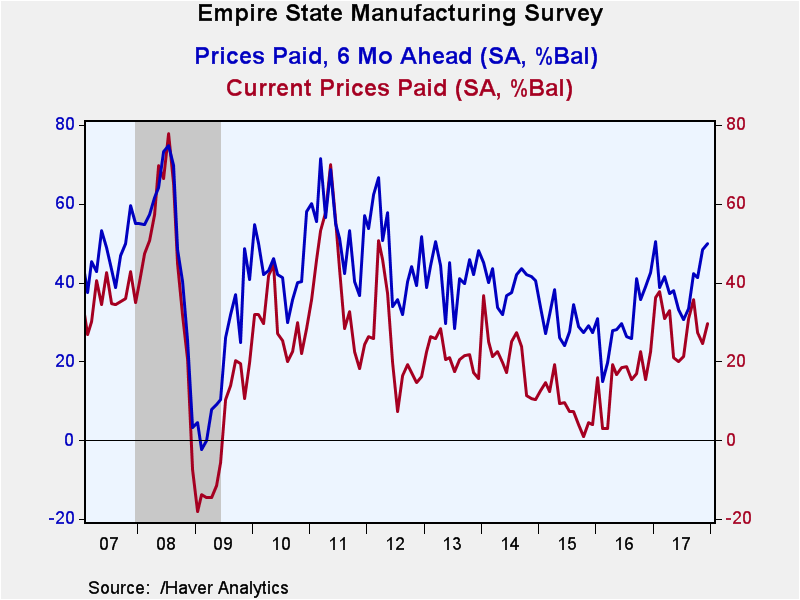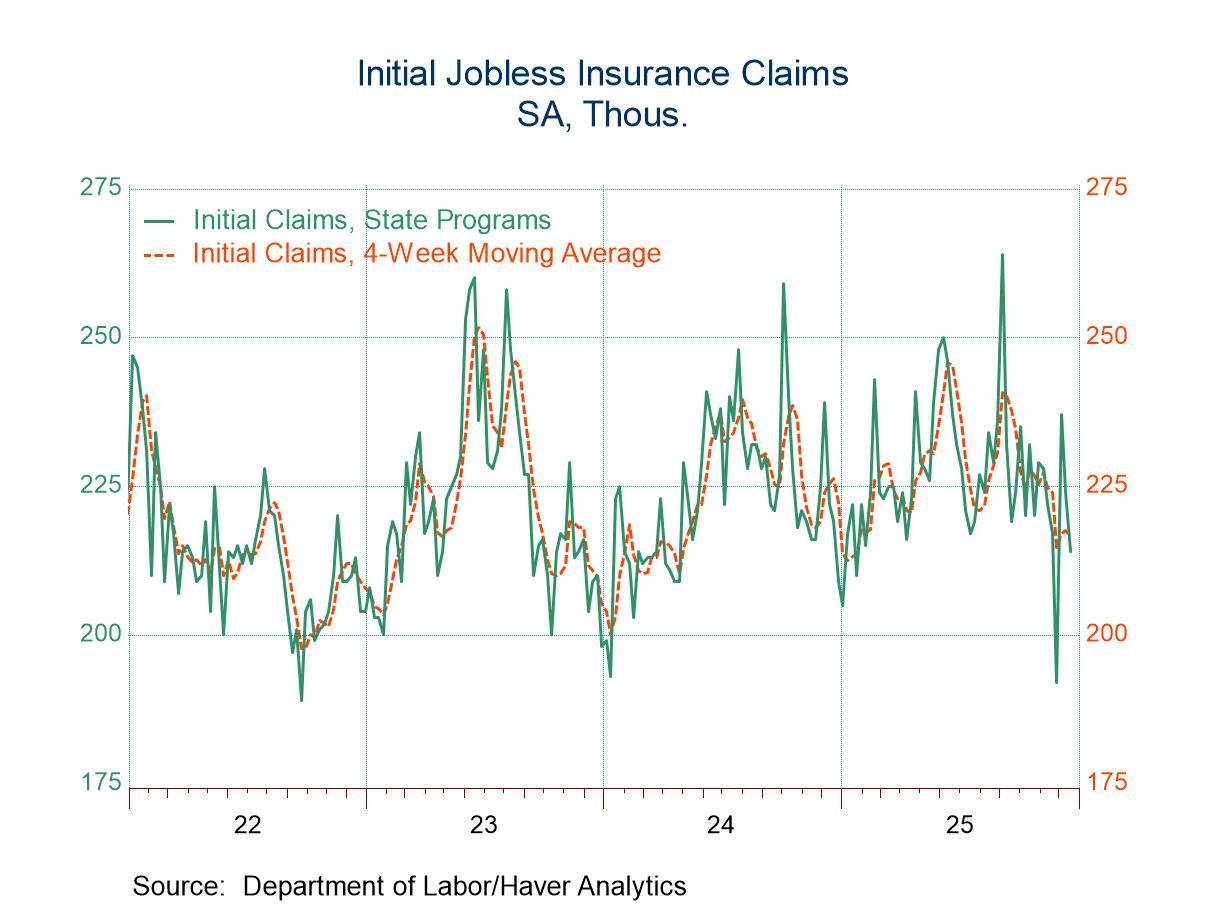 Global| Dec 15 2017
Global| Dec 15 2017Empire State Factory Sector Index Slips
by:Tom Moeller
|in:Economy in Brief
Summary
The Empire State Manufacturing Index of General Business Conditions in December fell to 18.0 following an unrevised decline to 19.4 during November. The latest level was the lowest since July, but continued to indicate expansion in [...]
The Empire State Manufacturing Index of General Business Conditions in December fell to 18.0 following an unrevised decline to 19.4 during November. The latest level was the lowest since July, but continued to indicate expansion in factory sector activity. During all of this year, the index rose to 16.1 from roughly -2.5 during the prior two years. The latest level matched expectations in the Action Economics Forecast Survey. These data, reported by the Federal Reserve Bank of New York, reflect business conditions in New York, northern New Jersey and southern Connecticut.
Based on these figures, Haver Analytics calculates a seasonally adjusted index that is comparable to the ISM series. The adjusted figure held steady at 55.3, but remained near its recent high. During the last ten years, the index posted a 63% correlation with the change in real GDP.
The component series exhibited mixed performance m/m. The new orders series eased, but was greatly improved versus the 2016 low. The unfilled orders and the inventories indexes also declined. Moving higher were the shipments and delivery times series. The latter index still registered fairly quick delivery speeds.
The employment index declined m/m to the lowest level since July. Nevertheless, the index registered positive payroll growth for the year following the 2016 decline. During the last ten years, there has been a 69% correlation between the employment index and the m/m change in factory sector payrolls. Seventeen percent of respondents reported a higher payroll level while twelve percent reported a decline. The employee workweek reading has been near zero for three months at the lowest level since January, off sharply versus its March high.
The prices paid series improved moderately and remained up sharply versus the 2015 low. Thirty-one percent of respondents indicated paying higher prices, while one percent reported them lower. The prices received index rose moderately, but has trended sideways this year.
Expectations of business conditions six months ahead fell from its twelve-month high. New orders fell sharply but employment surged. Expected prices paid also strengthened.
The Empire State figures are diffusion indexes, which are calculated by subtracting the percent of respondents reporting declines from those reporting gains. The data are available in Haver's SURVEYS database. The ISM-adjusted headline index dates back to 2001. The Action Economics Forecasts can be found in Haver's AS1REPNA database.
| Empire State Manufacturing Survey | Dec | Nov | Oct | Dec'16 | 2017 | 2016 | 2015 |
|---|---|---|---|---|---|---|---|
| General Business Conditions (Diffusion Index, %, SA) | 18.0 | 19.4 | 30.2 | 7.6 | 16.1 | -2.5 | -2.3 |
| General Business Conditions Index (ISM Adjusted, >50=Increasing Activity, SA) | 55.3 | 55.3 | 55.6 | 48.5 | 54.6 | 48.2 | 48.9 |
| New Orders | 18.5 | 20.7 | 18.0 | 10.4 | 14.6 | -0.7 | -5.6 |
| Shipments | 22.4 | 18.4 | 27.5 | 8.6 | 15.9 | 1.8 | 4.0 |
| Unfilled Orders | -8.7 | -4.6 | 2.3 | -10.4 | 1.9 | -8.8 | -10.5 |
| Delivery Time | 4.3 | -2.3 | 3.1 | -7.8 | 6.1 | -4.8 | -5.3 |
| Inventories | 1.4 | 4.6 | -7.8 | -13.9 | 1.5 | -9.6 | -7.1 |
| Number of Employees | 5.1 | 11.5 | 15.6 | -12.2 | 8.0 | -5.0 | 2.7 |
| Average Employee Workweek | 0.0 | -0.8 | 0.0 | -7.0 | 4.6 | -5.4 | -5.3 |
| Prices Paid | 29.7 | 24.6 | 27.3 | 22.6 | 29.0 | 15.7 | 8.8 |
| Expectations 6 Months Ahead | 46.6 | 49.9 | 44.8 | 49.7 | 42.5 | 29.0 | 30.3 |
Tom Moeller
AuthorMore in Author Profile »Prior to joining Haver Analytics in 2000, Mr. Moeller worked as the Economist at Chancellor Capital Management from 1985 to 1999. There, he developed comprehensive economic forecasts and interpreted economic data for equity and fixed income portfolio managers. Also at Chancellor, Mr. Moeller worked as an equity analyst and was responsible for researching and rating companies in the economically sensitive automobile and housing industries for investment in Chancellor’s equity portfolio. Prior to joining Chancellor, Mr. Moeller was an Economist at Citibank from 1979 to 1984. He also analyzed pricing behavior in the metals industry for the Council on Wage and Price Stability in Washington, D.C. In 1999, Mr. Moeller received the award for most accurate forecast from the Forecasters' Club of New York. From 1990 to 1992 he was President of the New York Association for Business Economists. Mr. Moeller earned an M.B.A. in Finance from Fordham University, where he graduated in 1987. He holds a Bachelor of Arts in Economics from George Washington University.










